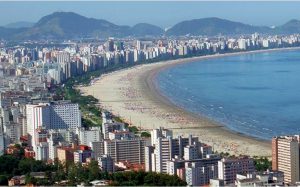. . DEMOCRATIC PARTICIPATION . .
An article by Herbert Lima and Helena Lourenço
We have great news! After six years and many delays, the city of Santos has created a Commission of Peace. Of course, our organization, ABrasOFFA, is participating.

Photo: Santos is especially famous for its beach
The Commission, with its weekly meetings, is organized to be able to generate impact on public, private and civil society activities of the municipality, with a focus on reducing violence through practices that encourage democratic participation of all citizens of the city. The commission supports actions such as the support of the Mayors for Peace Network, of which the city of Santos is a representative, as well as support activities of civil society, such as the “Paz na ponta do Giz” project of ABrasOFFA that promotes the concepts of peace within schools. The commission also supports meetings and events such as the ceremony in memory for the people killed in combat during the war, and peace day activities. A key role of the commission is to make the subject of PEACE a priority on the agendas of all leaders of the city (whether formal, such as the mayor and city representatives, or informal such as leaders that influence citizens’ decisions).
The idea for the Commission emerged six years ago from an initiative of ABrasOFFA- the Brazilian Association of Folklore Festivals Organizers – a nonprofit organization (NGO) that has always been an activist in the promotion of peace and that has undertaken several works against violence in the city of Santos, Brazil. In 2010 the ABrasOFFa held the 1st Congress of Peace in the Americas, which was attended by several scholars, including Dr. David Adams, who suggested the creation of the Commission for Peace in the city.
ABrasOFFA and the Santos City Hall saw the opportunity to improve the promotion of peace and reduce violence in the city with the formalization of a group of people who could have representation and discuss the ways for a more peaceful society. For some time the formation of the commission was discussed, until finally formalized in a democratic manner, hosting representatives of all civil society.
The Culture of Peace Commission is made up of people who are aware of the challenge that exists for the promotion of a culture of peace in the city. It is a long walk on a road that builds itself as we walk over it; we cannot see the end of it, but it is known that the end is a much better place than the one we are living today
(Click here for a Portuguese version of this article)